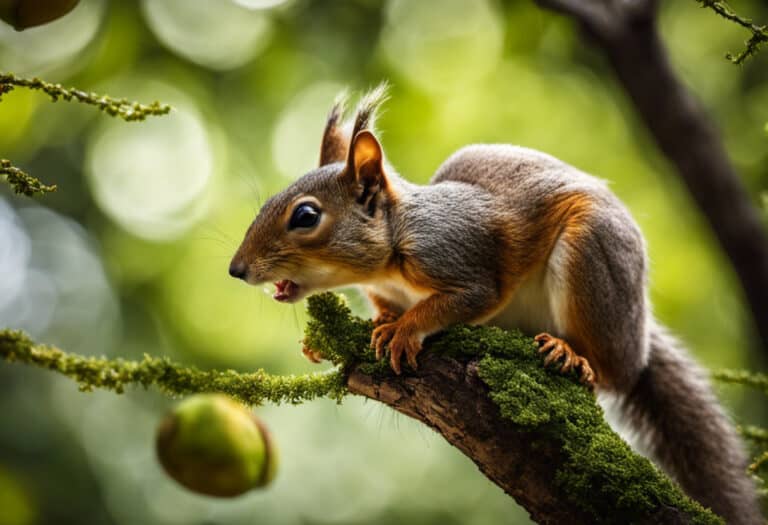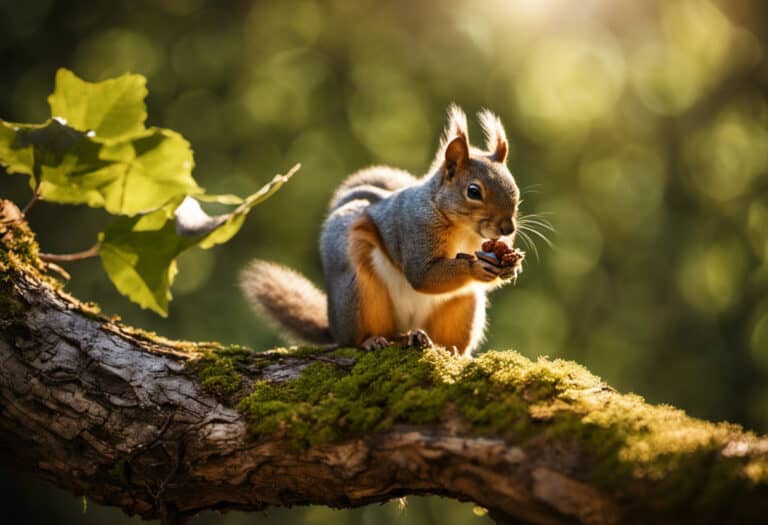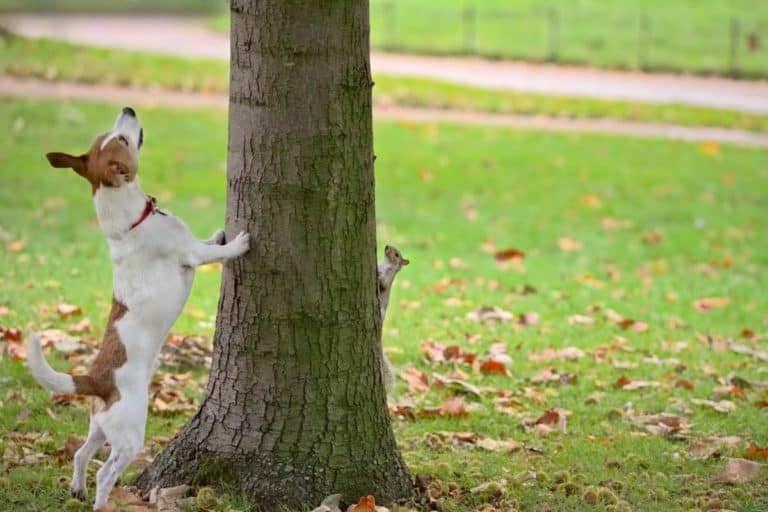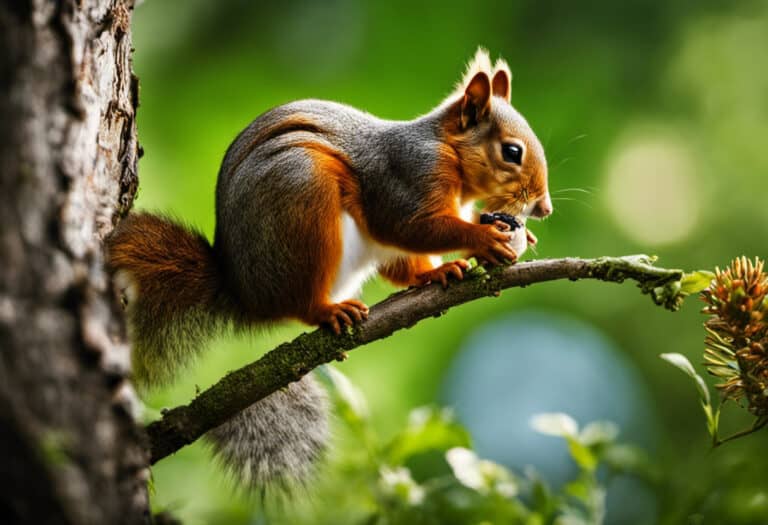What Are Squirrels Afraid of?
Are you curious about what makes squirrels tremble in fear? Well, brace yourself because this article is about to unravel the deepest secrets of squirrel phobias.
Have you ever wondered what scares these bushy-tailed creatures the most? From thunderstorms to surprising movements, squirrels have a wide range of fears that can send them scurrying for cover.
Prepare to delve into the fascinating world of squirrel anxieties and discover what truly makes their hearts race with terror.
Key Takeaways
- Squirrels are most afraid of predators such as hawks and foxes.
- They have a deep-rooted fear of humans and perceive them as unpredictable and potentially dangerous.
- Squirrels rely on their speed and agility to escape from dogs, which they have a fearful and competitive relationship with.
- Loud noises, such as fireworks and thunderstorms, trigger fear in squirrels and can disrupt their feeding and nesting behaviors.
Loud Noises
Loud noises can really startle you, making squirrels scurry away in fear. Squirrels, like many animals, have a natural instinct to flee when they perceive a potential threat.
Fireworks and thunderstorms are two examples of loud noises that can trigger this response in squirrels. Fireworks, with their explosive sounds and bright lights, mimic the sound of thunder and lightning, which can be terrifying for these small creatures. Thunderstorms, with their loud crashes of thunder and sudden flashes of lightning, create a chaotic and unpredictable environment that can be extremely distressing for squirrels.
In these situations, squirrels seek safety by retreating to their nests or burrows, where they feel protected from the perceived danger. Understanding the impact of loud noises on squirrels can help us better appreciate their natural behaviors and provide them with a safe and peaceful environment.
Predators
Stay alert for predators like hawks and foxes that could pose a threat to you. Squirrels, though agile and quick, are not immune to the dangers lurking in their environment. These fearful felines and natural enemies can cause significant harm if caught off guard.
To protect yourself, remember the following:
- Look for signs of hawks circling overhead. Their keen eyesight and sharp talons make them a formidable adversary. Stay close to tree trunks and branches to minimize exposure.
- Foxes, with their cunning nature, can silently stalk their prey. Be aware of your surroundings and listen for any rustling noises that may indicate their presence. Avoid areas where foxes are known to frequent.
- Utilize the power of your tail. Squirrels use their tails for balance and communication. A quick flick or wave can signal danger to others nearby, allowing them to take evasive action.
Humans
Be cautious around humans, as their unpredictable behavior can pose a potential threat to your safety. Squirrels, though small and seemingly harmless, have a deep-rooted fear of humans. This fear stems from their natural instinct to survive and avoid potential danger. While some squirrels may appear friendly and approachable, it is essential to remember that they are wild animals and can display aggression when feeling threatened. To better understand squirrel aggression, let us examine a table that showcases common aggressive behaviors displayed by squirrels when encountering humans.
| Aggressive Behavior | Description | Possible Causes |
|---|---|---|
| Biting | Inflicting pain through sharp teeth | Feeling cornered or provoked |
| Scratching | Using sharp claws to cause harm | Feeling alarmed or protecting young |
| Chasing | Pursuing humans at fast speeds | Feeling territorial or threatened |
| Vocalizations | Emitting loud and aggressive sounds | Displaying agitation or fear |
| Tail Flicking | Rapidly moving tail in a jerky motion | Signaling aggression or irritation |
Dogs
When it comes to the interaction between squirrels and canines, these two species have a complex relationship that can be described as fearful and competitive.
Canines, such as dogs, are natural predators for squirrels, and their presence can instill fear in these furry creatures.
Squirrels have evolved various defense mechanisms to avoid becoming prey, such as their ability to climb trees and their agility in navigating their environment.
Squirrels Vs. Canines
Watch out for those dogs! They can be quite intimidating to squirrels. When faced with canine aggression, squirrels have developed various defense mechanisms to ensure their survival. Here are three ways squirrels protect themselves against dogs:
- Speed and agility: Squirrels are known for their quick movements and nimble jumps. When threatened by a dog, they rely on their ability to swiftly climb trees, leap from branch to branch, and navigate through obstacles to escape the predator’s reach.
- Alertness and vigilance: Squirrels have excellent senses, including sharp vision and acute hearing. They stay constantly alert for any signs of danger, including the presence of dogs. This heightened awareness allows them to detect the approaching canine in advance and take evasive actions.
- Vocalization and distraction: When a squirrel feels threatened by a dog, it may emit loud alarm calls to warn other squirrels in the vicinity. Additionally, squirrels are known to engage in distraction displays, such as tail flicking and erratic movements, to divert the dog’s attention away from their escape route.
Fearful Furry Foes
Don’t underestimate the furry foes that make you fearful. When it comes to predator avoidance, squirrels have developed an impressive prey response. These small rodents have evolved a set of behaviors and instincts that allow them to detect and evade potential threats in their environment.
Squirrel prey response is a complex and finely tuned survival mechanism. When faced with a potential predator, such as a dog or a cat, squirrels rely on their acute senses to detect danger. Their keen eyesight and hearing enable them to spot predators from a distance and quickly assess the level of threat.
Once a predator is detected, squirrels employ a variety of avoidance tactics. They may freeze, hoping to blend in with their surroundings and avoid detection. Alternatively, they may flee, using their nimble bodies and impressive jumping abilities to quickly escape to safety. In some cases, squirrels may even engage in vocalization, emitting alarm calls to alert others in the area of the potential danger.
Birds of Prey
When it comes to squirrel prey response and predator avoidance techniques, squirrels have evolved various strategies to increase their chances of survival.
One key response is their ability to detect potential predators through visual and auditory cues, enabling them to react quickly and seek shelter.
Additionally, squirrels exhibit impressive agility and speed, allowing them to navigate complex environments and evade predators with ease.
These adaptive behaviors highlight the remarkable adaptability and resourcefulness of squirrels in their ongoing struggle to avoid becoming prey.
Squirrel Prey Response
You should be aware that squirrels exhibit a prey response when they sense danger. This instinctive behavior helps them in predator evasion and increases their chances of survival.
Here are three key survival strategies that squirrels employ when faced with potential threats:
- Freeze: When a squirrel detects danger, it may freeze in place, remaining completely still. This strategy allows them to blend in with their surroundings, making it harder for predators to spot them.
- Hide: Squirrels are skilled at finding hiding spots, such as tree hollows or dense foliage, where they can take shelter from predators. By concealing themselves, they minimize the risk of being detected.
- Flee: Perhaps the most well-known survival strategy of squirrels is their ability to quickly escape from danger. Squirrels are incredibly agile and can run at high speeds to evade predators, utilizing their strong hind legs and long tails for balance and quick changes in direction.
Predator Avoidance Techniques?
To stay safe from predators, it’s important to be aware of the various techniques animals use to avoid them. One such technique is predator camouflage, where animals blend into their surroundings to become less visible. This can be seen in the example of the stick insect, which resembles a twig and is difficult for predators to spot. Mimicry is another effective technique, where animals imitate the appearance or behavior of another species to deter predators. This can be seen in the case of the viceroy butterfly, which mimics the poisonous monarch butterfly to avoid being eaten. By employing these techniques, animals are able to increase their chances of survival and reduce the risk of predation.
| Technique | Example |
|---|---|
| Predator Camouflage | Stick insect |
| Mimicry | Viceroy butterfly |
Fireworks
Avoid setting off fireworks near squirrels because the loud noises can scare them. Squirrels have highly sensitive hearing, and the sudden explosions and crackling sounds of fireworks can cause them to become frightened and agitated.
Here are three reasons why fireworks can be particularly distressing for squirrels:
- Heightened startle response: Squirrels have evolved to be alert to potential threats in their environment. The loud and unpredictable noises of fireworks mimic the sounds of thunderstorms, which can trigger their natural instinct to seek shelter and safety.
- Disruption of feeding and nesting behaviors: Squirrels rely on their keen sense of hearing to detect predators and locate food sources. The sudden bursts of noise from fireworks can interrupt their foraging and feeding patterns, leading to increased stress and decreased food intake.
- Increased risk of injury: When squirrels are startled by fireworks, they may panic and attempt to flee. This can lead to accidents, such as falling from trees or colliding with objects, which can result in injuries or even death.
To protect squirrels and minimize their distress, it is best to enjoy fireworks displays away from their habitats.
Thunderstorms
During thunderstorms, squirrels may seek shelter and safety due to the loud and unpredictable sounds that mimic fireworks. Squirrels have a natural instinct to protect themselves from potential dangers, and thunderstorms can be perceived as threatening due to the sudden loud noises and bright flashes of lightning.
This reaction is often referred to as thunderstorm anxiety or lightning phobia. When a thunderstorm approaches, squirrels may exhibit signs of anxiety such as restlessness, increased alertness, and seeking refuge in tree hollows or leafy nests. They may also exhibit behaviors such as tail flicking and vocalizations.
These reactions are adaptive responses that help squirrels survive in the wild by avoiding potential threats. By seeking shelter during thunderstorms, squirrels increase their chances of staying safe and minimizing the risks associated with these natural events.
Strange Smells
When it comes to keeping squirrels away, scent deterrents can be a useful option. There are various scents that squirrels find unpleasant and can be used to deter them from certain areas.
Additionally, there are some unusual repellent options available that can be effective in keeping squirrels away from your property.
Scent Deterrents for Squirrels
To keep squirrels away from your garden, try using scented deterrents like peppermint oil or hot pepper spray. Squirrels have a keen sense of smell, and certain odors can be very unpleasant for them. Here are some natural remedies you can use to deter squirrels:
- Peppermint oil: Squirrels dislike the strong scent of peppermint oil. You can make a homemade spray by mixing a few drops of peppermint oil with water and spraying it around your garden.
- Hot pepper spray: Squirrels are also deterred by the spicy scent of hot peppers. You can make a hot pepper spray by blending hot peppers with water and straining the mixture. Spray it on the plants or areas where squirrels are causing damage.
- Garlic: Squirrels find the smell of garlic repulsive. You can crush garlic cloves and scatter them around your garden to deter squirrels.
Using these scented deterrents can help you protect your garden from squirrel damage naturally.
Unusual Repellent Options
One unconventional way to repel squirrels from your garden is by using motion-activated sprinklers.
These innovative devices are designed to detect the movement of squirrels and release a sudden burst of water, startling the squirrels and encouraging them to stay away from your garden.
Motion-activated sprinklers work by using infrared sensors to detect the heat signature of squirrels as they approach your garden. Once detected, the sprinkler system is activated, releasing a powerful jet of water that can reach up to 30 feet.
This sudden burst of water startles the squirrels and disrupts their behavior, making them less likely to return to your garden.
Motion-activated sprinklers are a safe and effective squirrel repellent that can help protect your garden from these pesky rodents.
Unexpected Movements
Avoid making sudden movements around squirrels, as they are easily startled by unexpected actions.
Squirrels have evolved to be highly sensitive to potential threats in their environment, and their predator avoidance strategies rely heavily on their ability to detect and respond to sudden movements.
When faced with a potential predator, such as a human or a larger animal, squirrels exhibit a prey response that involves freezing, fleeing, or engaging in aggressive behaviors. This response allows them to quickly assess the situation and choose the most appropriate course of action to ensure their survival.
By avoiding sudden movements around squirrels, you can help reduce their stress levels and allow them to go about their daily activities without unnecessary disruptions.
Remember to always respect wildlife and observe them from a safe distance.
Water
When you’re near bodies of water, be cautious of potential hazards and always prioritize your safety. While squirrels are generally agile and adept climbers, their swimming abilities are limited. Squirrels are not natural swimmers and can easily become overwhelmed in water. They may paddle their legs frantically, but their small size and lack of buoyancy make it difficult for them to stay afloat for long periods. Additionally, squirrels have a natural fear of water and will often avoid it if possible. This aversion to water may be due to their fur’s inability to repel moisture effectively, which can leave them cold and vulnerable. Furthermore, squirrels are not fans of rain either. They will seek shelter during a downpour and wait for the rain to subside before resuming their activities.
To emphasize the point, let’s take a look at this table:
| Squirrels and Swimming | Squirrels and Rain |
|---|---|
| Limited swimming abilities | Seek shelter during rain |
| Small size and lack of buoyancy | Fur’s inability to repel moisture effectively |
| Natural aversion to water | Wait for rain to subside before resuming activities |
Frequently Asked Questions
How Do Squirrels React to Loud Noises?
When you encounter loud noises, squirrels react by becoming alert and cautious. They may freeze momentarily, scan the area for potential threats, and then retreat to a safe spot. Loud noises can disrupt squirrels’ daily activities and cause stress.
Are There Any Predators That Squirrels Are Not Afraid Of?
Predators are a constant threat to squirrels, but there are some fearless species that they are not afraid of. These predators may include larger birds, such as hawks, or even domesticated pets like cats.
Do Squirrels Differentiate Between Different Types of Humans?
Squirrels exhibit different behaviors in response to human interactions. They may distinguish between different types of humans based on their past experiences and learned behaviors. Further research is needed to fully understand squirrel behavior in relation to human interaction.
What Is the Typical Response of Squirrels Towards Dogs?
When encountering dogs, squirrels typically exhibit a cautious and instinctive response. They may freeze, flee, or take cover in trees, as part of their natural defense against potential predators.
Are Squirrels Afraid of All Species of Birds of Prey?
Various species of birds of prey can instill fear in squirrels due to their natural hunting instincts. When faced with a sudden loud noise, squirrels may exhibit heightened vigilance and engage in evasive maneuvers to avoid potential threats.
Conclusion
In conclusion, squirrels are fearful creatures that have a range of things that can scare them. Loud noises, such as thunderstorms or sudden claps, can startle and send them scurrying for cover. Predators like dogs, birds of prey, and even humans can instill a sense of fear and caution in these small creatures. Additionally, strange smells and unexpected movements can also trigger their anxiety.
However, one interesting statistic is that squirrels have a heightened fear of water. They avoid it at all costs, as they are not natural swimmers. Understanding these fears can help us coexist peacefully with these furry little creatures.






